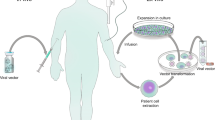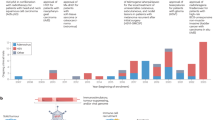Abstract
Vascular endothelial growth factor (VEGF), a major angiogenic factor, plays a key role in the growth of solid tumor. Recently, expression of VEGF and its receptors has been found on leukemic cells as well as on endothelial cells. VEGF may fulfill a fundamental role in promoting tumor angiogenesis and proliferation by stimulating both endothelial cells and leukemic cells. To investigate the role of VEGF in the angiogenesis and growth of leukemic cell, we used an antisense strategy to downregulate VEGF expression in K562 cells, a human erythroleukemia cell line. Expression of antisense-VEGF in K562 cells reduced the secretion of VEGF protein and inhibited cell survival. The proliferation and migration of human umbilical vein endothelial cells were decreased in response to the conditioned medium (CM) from K562 cells expressed antisense-VEGF, compared to CM from K562 cells transfected with vector control. Moreover, subcutaneous injection of nude mice with antisense-VEGF K562 cells inhibited tumor growth with a reduction of the density of microvessels and an increased apoptosis in those tumors, compared to vector control K562 cells. These results suggest that the efficient downregulation of the VEGF production in leukemic cells using antisense-VEGF may constitute a novel strategy of treatment in leukemia.
This is a preview of subscription content, access via your institution
Access options
Subscribe to this journal
Receive 12 print issues and online access
$259.00 per year
only $21.58 per issue
Buy this article
- Purchase on Springer Link
- Instant access to full article PDF
Prices may be subject to local taxes which are calculated during checkout






Similar content being viewed by others
References
Houck KA, Ferrara N, Winer J, Cachianes G, Li B, Leung DW . The vascular endothelial growth factor family: identification of a fourth molecular species and characterization of alternative splicing of RNA. Mol Endocrinol. 1991;5:1806–1814.
Kim KJ, Li B, Armanin M, Gillett N, Phillip HS, Ferrara N . Inhibition of vascular endothelial growth factor-induced angiogenesis suppresses tumor growth in vivo. Nature. 1993;362:841–844.
Toi M, Hosshina, Takayanagi T, Tominaga T . Association of vascular endothelial growth factor expression with tumor angiogenesis and with early relapse in primary breast cancer. Jpn J Cancer Res. 1994;85:1045–1049.
Drake CJ, Little CD. VEGF and vascular fusion: implication for normal and pathological vessels. J Histochem Cytochem. 1999;47:1351–1356.
Weider N, Semple JP, Welch WR, Folkman J . Tumor angiogenesis and metastasis-correlation in invasive breast carcinoma. N Engl J Med. 1991;324:1–8.
O'Brien T, Cranston D, Fuggle S, Bicknell R, Harris AL . Different angiogenic pathways characterize superficial and invasive bladder cancer. Cancer Res. 1995;55:510–513.
Takahashi Y, Kitadai Y, Bucana CD, Cleary KR, Ellis LM . Expression of vascular endothelial growth factor and its receptor, KDR, correlates with vascularity, metastasis, and proliferation of human colon cancer. Cancer Res. 1995;55:3964–3968.
Salven P, Ruotsalainen T, Mattson K, Joensuu H . High pre-treatment serum level of vascular endothelial growth factor (VEGF) is associated with poor outcome in small-cell lung cancer. Int J Cancer. 1998;79:144–146.
Leung DW, Cachianes G, Kuang WJ, Goeddel DV, Ferrara N . Vascular endothelial growth factor is a secreted angiogenic mitogen. Science. 1989;246:1306–1309.
Katoh O, Tauchi H, Kawaishi K, Kimura A, Satow Y . Expression of the vascular endothelial growth factor (VEGF) receptor gene, KDR, in hematopoietic cells and inhibitory effect of VEGF on apoptotic cell death caused by ionizing radiation. Cancer Res. 1995;55:5687–5692.
Shalaby F, Ho J, Stanford WL, et al. A requirement for Flk-1 in primitive and definitive hematopoiesis and vasculogenesis. Cell. 1997;89:981–990.
Hattori K, Dias S, Heissig B, et al. Vascular endothelial growth factor and angiopoietin-1 stimulate postnatal hematopoiesis by recruitment of vasculogenic and hematopoietic stem cells. J Exp Med. 2001;193:1005–1014.
Bellamy WT, Richter L, Frutiger Y, Grogan TM . Expression of vascular endothelial growth factor and its receptors in hematopoietic malignancies. Cancer Res. 1999;59:728–733.
Aguayo A, Estey E, Kantarjian H, et al. Cellular vascular endothelial growth factor is a predictor of outcome in patients with acute myeloid leukemia. Blood. 1999;94:3717–3721
Aguayo A, O'Brien S, Keating M, et al. Clinical relevance of intracellular vascular endothelial growth factor levels in B-cell chronic lymphocytic leukemia. Blood. 2000;96:768–770.
Aguayo A, Kantarjian H, Manshouri T, et al. Angiogenesis in acute and chronic leukemias and myelodysplastic syndromes. Blood. 2000;96:2240–2245.
Brogi E, Schatteman G, Wu T, et al. Hypoxia-induced paracrine regulation of vascular endothelial growth factor receptor expression. J Clin Invest. 1996;97:469–476.
Fiedler W, Graeven U, Ergun S, et al. Vascular endothelial growth factor, a possible paracrine factor in human acute myeloid leukemia. Blood. 1997;89:1870–1875.
Dias S, Hattori K, Zhou Z, et al. Autocrine stimulation of VEGFR-2 activates human leukemic cell growth and migration. J Clin Invest. 2000; 106: 511–521.
List AF . Vascular endothelial growth factor signaling pathway as an emerging target in hematologic malignancies. Oncologist. 2001;6(Suppl 1):24–31.
Gerber H-P, Malik AK, Solar GP, et al. VEGF regulates hematopoitic stem cell survival by an internal autocrine loop mechanism. Nature. 2002;417:954–958.
Nakashima T, Hudson JM, Clayman GL . Antisense inhibition of vascular endothelial growth factor in human head and neck squamous cell carcinoma. Head Neck. 2000;22:483–488.
Mordenti J, Thomsen K, Licko V, Chen H, Meng YG, Ferrara N . Efficacy and concentration-response of murine anti-VEGF monoclonal antibody in tumor-bearing mice and extrapolation to human. Toxicol Pathol. 1999;27:14–21.
Lin P, Sankar S, Shan S, et al. Inhibition of tumor growth by targeting tumor endothelium using a soluble vascular endothelial growth factor receptor. Cell Growth Differ. 1998;9:49–58.
Prewett M, Huber J, Yiwen Li, et al. Antivascular endothelial growth factor receptor (fetal liver kinase 1) monoclonal antibody inhibits tumor angiogenesis and growth of several mouse and human tumors. Cancer Res. 1999;59:5209–5218.
Dias S, Hattori K, Heissig B, et al. Inhibition of both paracrine and autocrine VEGF/VEGFR2 signaling pathways is essential to induce long-term remission of xenotransplanted human leukemias. Proc Natl Acad Sci USA. 2001;10857–10862.
Kang MA, Kim KY, Seol JY, Kim KC, Nam MJ . The growth inhibition of hepatoma by gene transfer of antisense vascular endothelial growth factor. J Gene Med. 2000;2:289–296.
Nguyen JT, Wu P, Clouse ME, Hlatky L, Terwilliger EF . Adeno-associated virus-mediated delivery of antiangiogenic factors as an antitumor strategy. Cancer Res. 1998;58:5673–5677.
Fusetti L, Pruneri G, Gobbi A, et al. Human myeloid and lymphoid malignancies in the non-obese diabetic/severe combined immunodeficiency mouse model: frequency of apoptotic cells in vascular endothelial growth factor production. Cancer Res. 2000;60:2527–2534.
Dias S, Shmelkov SV, Lam G, Rafii S . VEGF165 promotes survival of leukemic cells by Hsp-90-mediated induction of Bcl-2 expression and apoptosis inhibition. Blood. 2002;99:2532–2540.
Acknowledgements
This work was supported by the grants from the China National Foundation of Natural Science (39725014), the CMB-funded programs, the Ministry of Science & Technology of China, and the Tianjin Commission of Science and Technology (39725014).
Author information
Authors and Affiliations
Corresponding author
Rights and permissions
About this article
Cite this article
He, R., Liu, B., Yang, C. et al. Inhibition of K562 leukemia angiogenesis and growth by expression of antisense vascular endothelial growth factor (VEGF) sequence. Cancer Gene Ther 10, 879–886 (2003). https://doi.org/10.1038/sj.cgt.7700645
Received:
Published:
Issue Date:
DOI: https://doi.org/10.1038/sj.cgt.7700645
Keywords
This article is cited by
-
Overexpression of Hiwi Inhibits the Cell Growth of Chronic Myeloid Leukemia K562 Cells and Enhances Their Chemosensitivity to Daunomycin
Cell Biochemistry and Biophysics (2015)
-
Expression of vascular endothelial growth factor in normal, osteoarthritic and osteoporotic osteoblasts
Clinical and Experimental Medicine (2013)
-
Molecular beacon-based fluorescence biosensor for the detection of gene fragment and PCR amplification products related to chronic myelogenous leukemia
Analytical and Bioanalytical Chemistry (2012)
-
Dihydroartemisinin downregulates vascular endothelial growth factor expression and induces apoptosis in chronic myeloid leukemia K562 cells
Cancer Chemotherapy and Pharmacology (2006)
-
Enhanced growth suppression of Philadephia1 leukemia cells by targeting bcr3/abl2 and VEGF through antisense strategy
Leukemia (2005)



